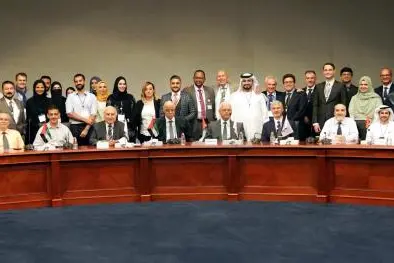PHOTO
Sharjah: The Sharjah Research Academy organised a workshop on ‘Wastewater Treatment and Reuse Methods in cooperation with the University of Sharjah, Sharjah Electricity and Water Authority (SEWA) and QATRA, a joint venture to develop a new water reuse plant in Sharjah.
The workshop was part of the efforts to promote sustainability and reduce the overuse of natural water resources. It was held at Sharjah Research Academy’s headquarters in Sharjah’s University City in the presence of a number of officials and researchers from the Academy, the University of Sharjah and various government departments in the Emirate. A number of topics were discussed, including the four organisations’ water reuse plant.
In his welcome address, Professor Dr Amr Abdel Hamid, Director of Sharjah Research Academy, hailed the Academy and the University of Sharjah’s close and fruitful cooperation on all applied research and development projects. He underlined the importance of accelerating the implementation of the outcomes of studies and research papers that aim to serve the community.
"This can best be done by promoting synergy between universities and government organisations to ensure that theory and conceptual frameworks are applied appropriately on the ground," he said.
Professor Hamid Al Naimiy, Chancellor of the University of Sharjah, underscored the importance of holding such workshops to discuss and resolve issues of concern to the community with a view to improving the environmental, social and health conditions of all community members.
During the workshop, Professor Mufid Al Samarai, Senior Advisor at the Sharjah Research Academy, gave a brief overview of the Academy and its role in wastewater management research.
Engineer Essam Al Mulla, Director of the Water Department at SEWA, pointed out that SEWA is using the latest aquifer storage and recovery methods to develop and store fresh water in the Emirate.
As members of the joint project's research team, Professor Abdallah Shanableh, Director of the Research Institute of Sciences and Engineering at the University of Sharjah, Dr Shorjo Bhattacharjee, Senior Researcher at the Academy, and Gurvan Gilles Dersel, General Manager of QATRA, presented their latest research findings and future outlook.
Engineer Zahra Yusuf from Sharjah Directorate of Public Works discussed the role that religion and government departments play in regulating the use of treated wastewater. Ariel Edwards of QATRA provided a summary of the panel discussions.
In the wrap-up, Professor Mufid Al Samarai re-emphasised the need to create a timetable for each organisation’s steps and tasks and the follow-up actions required to ensure the implementation of the recommendations discussed.
© Press Release 2019Disclaimer: The contents of this press release was provided from an external third party provider. This website is not responsible for, and does not control, such external content. This content is provided on an “as is” and “as available” basis and has not been edited in any way. Neither this website nor our affiliates guarantee the accuracy of or endorse the views or opinions expressed in this press release.
The press release is provided for informational purposes only. The content does not provide tax, legal or investment advice or opinion regarding the suitability, value or profitability of any particular security, portfolio or investment strategy. Neither this website nor our affiliates shall be liable for any errors or inaccuracies in the content, or for any actions taken by you in reliance thereon. You expressly agree that your use of the information within this article is at your sole risk.
To the fullest extent permitted by applicable law, this website, its parent company, its subsidiaries, its affiliates and the respective shareholders, directors, officers, employees, agents, advertisers, content providers and licensors will not be liable (jointly or severally) to you for any direct, indirect, consequential, special, incidental, punitive or exemplary damages, including without limitation, lost profits, lost savings and lost revenues, whether in negligence, tort, contract or any other theory of liability, even if the parties have been advised of the possibility or could have foreseen any such damages.




















